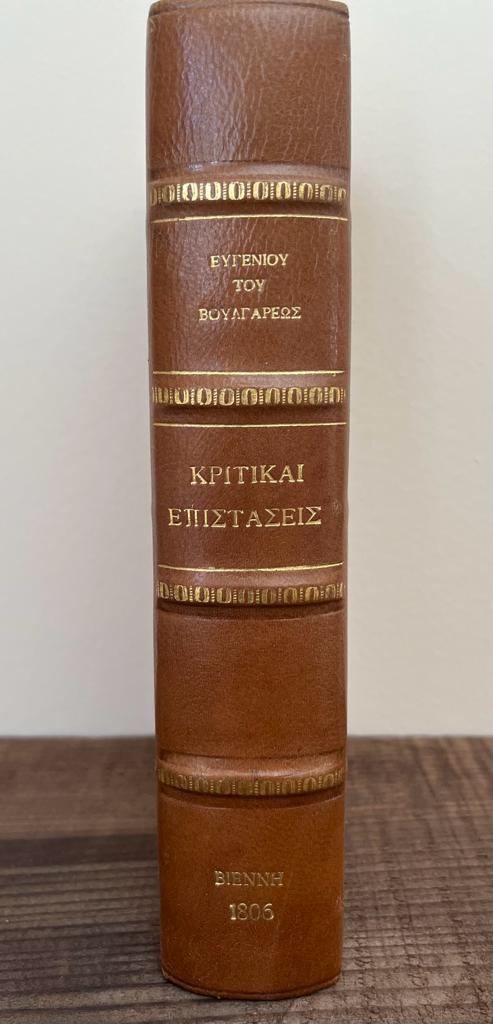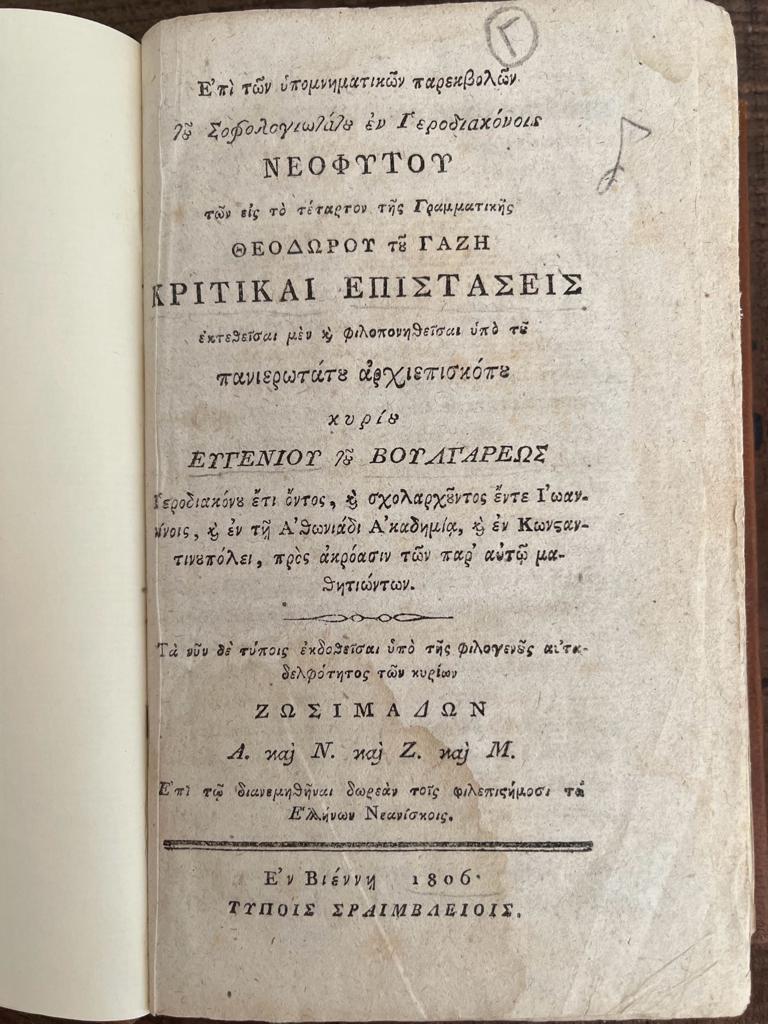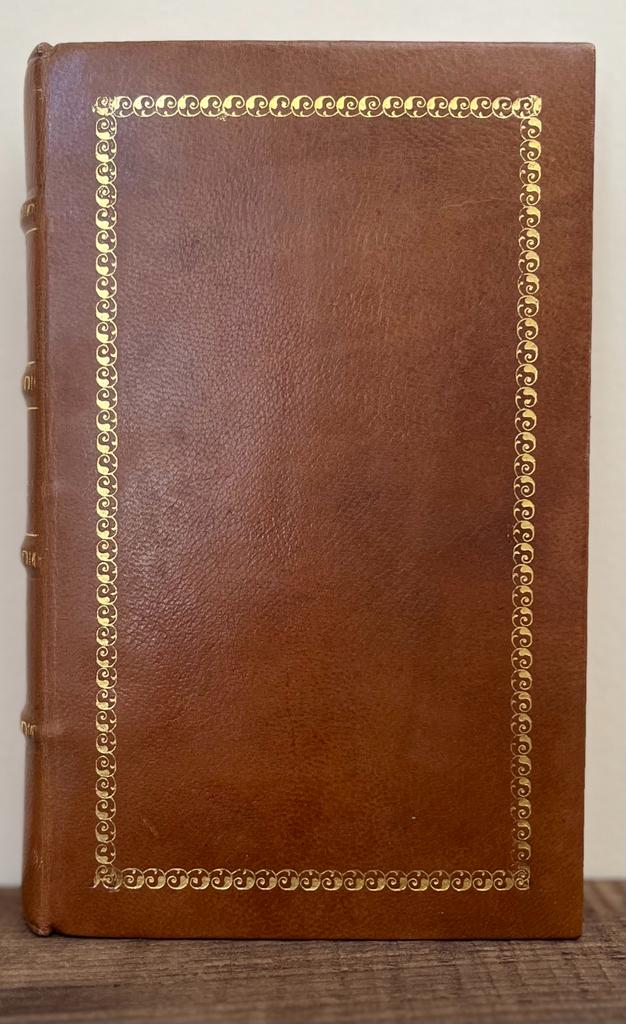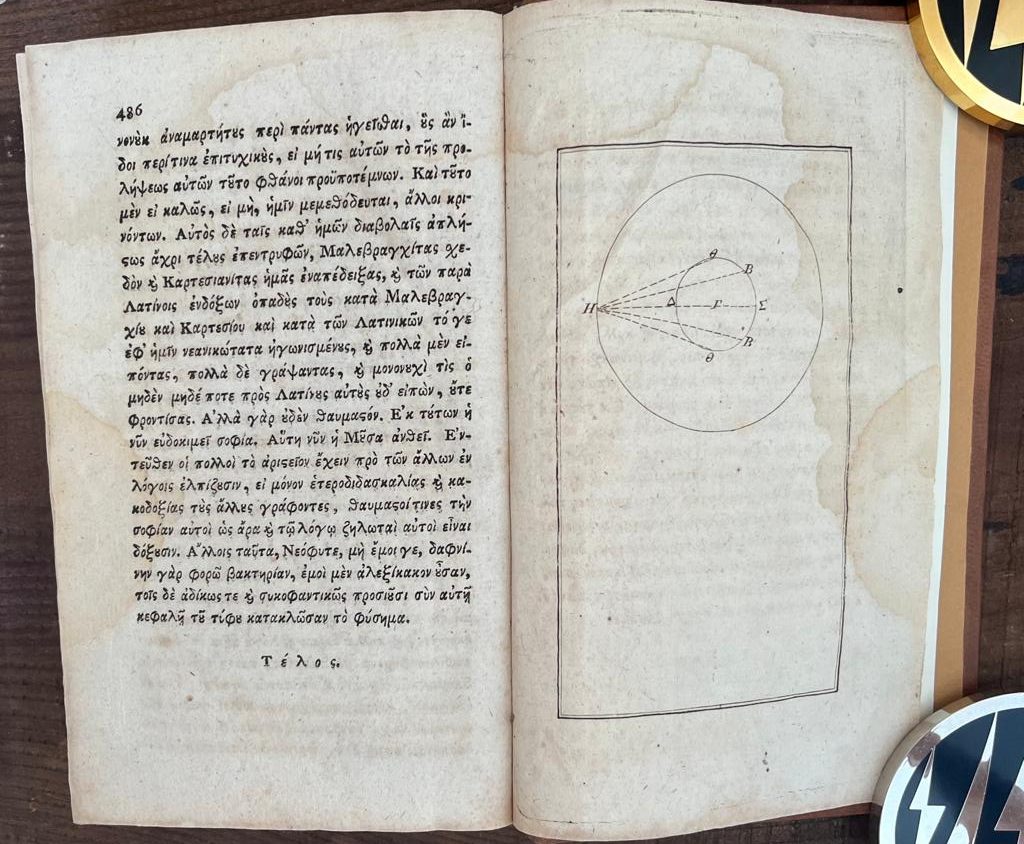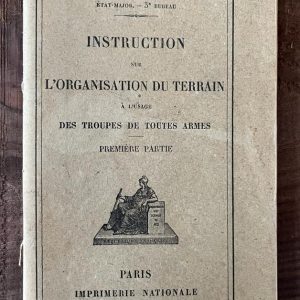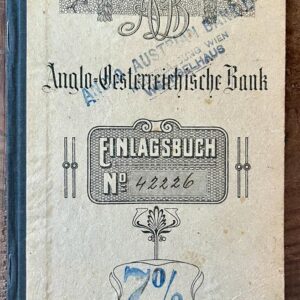Eugenios Voulgaris, Greek Enlightenment, Kritikai Epistaseis, Vienna in 1806, Theodoros Gazis, Zosimades, Neophytos Kavsokalyvitis
320.00€
First Edition and First Printing
Theodorus Gaza (Θεόδωρος Γαζῆς, Theodoros Gazis; (c. 1398 – c. 1475), was a Greek humanist
and translator of Aristotle, one of the Greek scholars who were the leaders of the
revival of learning in the 15th century (the Paleologan Renaissance). His Greek grammar (in four books), written in Greek, first printed at Venice in 1495, and afterwards partially translated by Erasmus in 1521, although in many respects defective, especially in its syntax, was for a long time the leading textbook.
Neophytos Kavsokalyvitis (1689 – 1784) was a Greek monk and ecclesiastical writer. He wrote many theological and philosophical works.
Description
ΕΥΓΕΝΙΟΣ ΒΟΥΛΓΑΡΗΣ
ΚΡΙΤΙΚΑΙ ΕΠΙΣΤΑΣΕΙΣ
Επί των υπομνηματικών παρεκβολών του Σοφολογιωτάτου εν Ιεροδιακόνοις Νεοφύτου
των εις το τέταρτον της Γραμματικής Θεοδώρου του Γαζή
κριτικαί Επιστάσεις εκτεθείσαι μεν και φιλοπονησθείσαι
υπό του πανιερωτάτου αρχιεπισκόπου κυρίου Ευγενίου του Βουλγάρεως.
Τα νυν δε τύποις εκδοθείσαι υπό της φιλογενούς αυταδελφότητος των κυρίων Ζωσιμάδων Α. Και Ν. Και Ζ. Και Μ.
Εν Βιέννη, 1806, τύποις Σραιμβλείοις.
8ο, σ.486+1 πιν. (χαλκογραφία)+1 λ
Epi ton Ipomnimatikon Parekvolon tou Sofologiotatou en Ierodiakonis Neofytou
ton is to Tetarton tis Grammatikis Theodorou tou Gazi
Kritikai Epistaseis Ektethise men ke filoponisthise
ypo tou Panierotatou Archiepiskopou Kyriou Eugeniou Voulgareos.
Ta nyn de Typois Ekdothise ypo tis Filogenous Avtadelfotitos ton Kyrion Zosimadon A. ke N. ke Z. ke M.
Eugenios Voulgaris
Kritikai Epistaseis
Critical notes on writings of Neophytos Kavsokalyvitis and on the grammar of Theodoros Gazis
Printed in Vienna in 1806 by Printing House Sremvliis
First Edition and First Printing
Octavo, Pages 486 + Engraving (table)
Fine new Leather Binding by Greek bookbinder Psallis!
Condition: Please see photos
Eugenios Voulgaris or Boulgaris[ (1716–1806) was a Greek Orthodox cleric, author, educator, mathematician, astronomer, physicist, and philosopher. He wrote about every discipline: legal, historical, theological, grammatical, linguistic, astronomy, political, mathematics, archaeology, music, secularism, euthanasia, and the tides. He wrote speeches, poems, appeals to Catherine II for the liberation of Greece, and hundreds of letters. He edited valuable editions of Byzantine writers and classical books and translated many texts from Latin into French. He was one of the students of Methodios Anthrakites. He translated many important foreign language academic documents into Greek. He was bishop of Cherson (in Crimea). He was a leading contributor to the Modern Greek Enlightenment
The Greek Enlightenment was given impetus by Greek dominance in commerce and education in the Ottoman Empire. This allowed Greek merchants to finance large numbers of young Greeks to study at universities in Italy and the German states. There, they were introduced to the ideas of the Enlightenment and the French Revolution. It was the wealth of the extensive Greek merchant class that provided the material basis for the intellectual renaissance that was the prominent feature of Greek life during the half century and more leading up to 1821. It was no accident that on the eve of the Greek War of Independence the epicenters of Greek learning, i.e. schools-universities, were located in Ioannina, Chios, Smyrna (Smirni) and Aivali (Kydonias), also Greek commercial centers.
The Zosimades (Greek: Ζωσιμάδες) or Zosimas brothers were 18th-19th century Greek benefactors and merchants.
Additional information
| Languages | Greek |
|---|

